- Home
- Roald Dahl
The Collected Short Stories of Roald Dahl Volume 2 Page 3
The Collected Short Stories of Roald Dahl Volume 2 Read online
Page 3
She might just as well have hit him with a steel club.
She stepped back a pace, waiting, and the funny thing was that he remained standing there for at least four or five seconds, gently swaying. Then he crashed to the carpet.
The violence of the crash, the noise, the small table overturning, helped bring her out of the shock. She came out slowly, feeling cold and surprised, and she stood for a while blinking at the body, still holding the ridiculous piece of meat tight with both hands.
All right, she told herself. So I've killed him.
It was extraordinary, now, how clear her mind became all of a sudden. She began thinking very fast. As the wife of a detective, she knew quite well what the penalty would be. That was fine. It made no difference to her. In fact, it would be a relief. On the other hand, what about the child? What were the laws about murderers with unborn children? Did they kill them both—mother and child? Or did they wait until the tenth month? What did they do?
Mary Maloney didn't know. And she certainly wasn't prepared to take a chance.
She carried the meat into the kitchen, placed it in a pan, turned the oven on high, and shoved it inside. Then she washed her hands and ran upstairs to the bedroom. She sat down before the mirror, tidied her face, touched up her lips and face. She tried a smile. It came out rather peculiar. She tried again.
"Hullo Sam," she said brightly, aloud.
The voice sounded peculiar too.
"I want some potatoes please, Sam. Yes, and I think a can of peas."
That was better. Both the smile and the voice were coming out better now. She rehearsed it several times more. Then she ran downstairs, took her coat, went out the back door, down the garden, into the street.
It wasn't six o'clock yet and the lights were still on in the grocery shop.
"Hullo Sam," she said brightly, smiling at the man behind the counter.
"Why, good evening, Mrs Maloney. How're you?"
"I want some potatoes please, Sam. Yes, and I think a can of peas."
The man turned and reached up behind him on the shelf for the peas.
"Patrick's decided he's tired and doesn't want to eat out tonight," she told him. "We usually go out Thursdays, you know, and now he's caught me without any vegetables in the house."
"Then how about meat, Mrs Maloney?"
"No, I've got meat, thanks. I got a nice leg of lamb, from the freezer."
"ih.
"I don't much like cooking it frozen, Sam, but I'm taking a chance on it this time. You think it'll be all right?"
"Personally," the grocer said, "I don't believe it makes any difference. You want these Idaho potatoes?"
"Oh yes, that'll be fine. Two of those."
"Anything else?" The grocer cocked his head on one side, looking at her pleasantly. "How about afterwards? What you going to give him for afterwards?"
"Well what would you suggest, Sam?"
The man glanced around his shop. "How about a nice big slice of cheesecake? I know he likes that."
"Perfect," she said. "He loves it."
And when it was all wrapped and she had paid she put on her brightest smile and said, "Thank you, Sam. Good night."
"Good night, Mrs Maloney. And thank you."
And now, she told herself as she hurried back, all she was doing now, she was returning home to her husband and he was waiting for his supper; and she must cook it good, and make it as tasty as possible because the poor man was tired; and if, when she entered the house, she happened to find anything unusual, or tragic, or terrible, then naturally it would be a shock and she'd become frantic with grief and horror. Mind you, she wasn't expecting to find anything. She was just going home with the vegetables. Mrs Patrick Maloney going home with the vegetables on Thursday evening to cook supper for her husband.
That's the way, she told herself. Do everything right and natural. Keep things absolutely natural and there'll be no need for any acting at all.
Therefore, when she entered the kitchen by the back door, she was humming a little tune to herself and smiling.
"Patrick!" she called. "How are you darling?"
She put the parcel down on the table and went through into the living-room; and when she saw him lying there on the floor with his legs doubled up and one arm twisted back underneath his body, it really was rather a shock. All the old love and longing for him welled up inside her, and she ran over to him, knelt down beside him, and began to cry her heart out. It was easy. No acting was necessary.
A few minutes later she got up and went to the phone. She knew the number of the police station, and when the man at the other end answered, she cried to him, "Quick! Come quick! Patrick's dead!"
"Who's speaking?"
"Mrs Maloney. Mrs Patrick Maloney."
"You mean Patrick Maloney's dead?"
"I think so," she sobbed. "He's lying on the floor and I think he's dead."
"Be right over," the man said.
The car came over quickly, and when she opened the front door, two policemen walked in. She knew them both—she knew nearly all the men at that precinct—and she fell right into Jack Noonan's arms, weeping hysterically. He put her gently into a chair, then went over to join the other one, who was called O'Malley, kneeling by the body.
"Is he dead?" she cried.
"I'm afraid he is. What happened?"
Briefly, she told her story about going out to the grocer and coming back to find him on the floor. While she was talking, crying and talking, Noonan discovered a small patch of congealed blood on the dead man's head. He showed it to O'Malley who got up at once and hurried to the phone.
Soon, other men began to come into the house. First a doctor, then two detectives, one of whom she knew by name. Later, a police photographer arrived and took pictures, and a man who knew about fingerprints. There was a great deal of whispering and muttering beside the corpse, and the detectives kept asking her a lot of questions. But they always treated her kindly. She told her story again, this time right from the beginning, when Patrick had come in, and she was sewing, and he was tired, so tired he hadn't wanted to go out for supper. She told how she'd put the meat in the oven—"it's there now, cooking"—and how she'd slipped out to the grocer for vegetables, and come back to find him lying on the floor.
"Which grocer?" one of the detectives asked.
She told him, and he turned and whispered something to the other detective who immediately went outside into the street.
In fifteen minutes he was back with a page of notes, and there was more whispering, and through her sobbing she heard a few of the whispered phrases "… acted quite normal very cheerful… wanted to give him a good supper… peas… cheesecake… impossible that she..
After a while, the photographer and the doctor departed and two other men came in and took the corpse away on a stretcher. Then the fingerprint man went away. The two detectives remained, and so did the two policemen. They were exceptionally nice to her, and Jack Noonan asked if she wouldn't rather go somewhere else, to her sister's house perhaps, or to his own wife who would take care of her and put her up for the night.
No, she said. She didn't feel she could move even a yard at the moment. Would they mind awfully if she stayed just where she was until she felt better? She didn't feel too good at the moment, she really didn't.
Then hadn't she better lie down on the bed? Jack Noonan asked.
No, she said, she'd like to stay right where she was, in this chair. A little later perhaps, when she felt better, she would move.
So they left her there while they went about their business, searching the house. Occasionally one of the detectives asked her another question. Sometimes Jack Noonan spoke to her gently as he passed by. Her husband, he told her, had been killed by a blow on the back of the head administered with a heavy blunt instrument, almost certainly a large piece of metal. They were looking for the weapon. The murderer may have taken it with him, but on the other hand he may've thrown it away or hidden it somewhere on the premises.
"It's the old story," he said. "Get the weapon, and you've got the man."
Later, one of the detectives came up and sat beside her. Did she know, he asked, of anything in the house that could've been used as the weapon? Would she mind having a look around to see if anything was missing a very big spanner for example, or a heavy metal vase.
They didn't have any heavy metal vases, she said.
"Or a big spanner?"
She didn't think they had a big spanner. But there might be some things like that in the garage.
The search went on. She knew that there were other policemen in the garden all around the house. She could hear their footsteps on the gravel outside, and sometimes she saw the flash of a torch through a chink in the curtains. It began to get late, nearly nine she noticed by the clock on the mantel. The four men searching the rooms seemed to be growing weary, a trifle exasperated.
"Jack," she said, the next time Sergeant Noonan went by. "Would you mind giving me a drink?"
"Sure I'll give you a drink. You mean this whisky?"
"Yes, please. But just a small one. It might make me feel better."
He handed her the glass. "Why don't you have one yourself," she said. "You must be awfully tired. Please do. You've been very good to me."
"Well," he answered. "It's not strictly allowed, but I might take just a drop to keep me going."
One by one the others came in and were persuaded to take a little nip of whisky. They stood around rather awkwardly with the drinks in their hands, uncomfortable in her presence, trying to say consoling things to her. Sergeant Noonan wandered into the kitchen, came out quickly and said, "Look, Mrs Maloney. You know that oven of yours is still on, and the meat still inside."
"Oh dear me!" she cried. "S
o it is!"
"I better turn it off for you, hadn't I?"
"Will you do that, Jack. Thank you so much."
When the sergeant returned the second time, she looked at him with her large, dark, tearful eyes. "Jack Noonan," she said.
"Yes?"
"Would you do me a small favour—you and these others?"
"We can try, Mrs Maloney."
"Well," she said. "Here you all are, and good friends of dear Patrick's too, and helping to catch the man who killed him. You must be terribly hungry by now because it's long past your supper time, and I know Patrick would never forgive me, God bless his soul, if I allowed you to remain in his house without offering you decent hospitality. Why don't you eat up that lamb that's in the oven? It'll be cooked just right by now."
"Wouldn't dream of it," Sergeant Noonan said.
"Please," she begged. "Please eat it. Personally I couldn't touch a thing, certainly not what's been in the house when he was here. But it's all right for you. It'd be a favour to me if you'd eat it up. Then you can go on with your work again afterwards."
There was a good deal of hesitating among the four policemen, but they were clearly hungry, and in the end they were persuaded to go into the kitchen and help themselves. The woman stayed where she was, listening to them through the open door, and she could hear them speaking among themselves, their voices thick and sloppy because their mouths were full of meat.
"Have some more, Charlie?"
"No. Better not finish it."
"She wants us to finish it. She said so. Be doing her a favour."
"Okay then. Give me some more."
"That is the hell of a big club the guy must've used to hit poor Patrick," one of them was saying. "The doc says his skull was smashed all to pieces just like from a sledge-hammer."
"That is why it ought to be easy to find."
"Exactly what I say."
"Whoever done it, they're not going to be carrying a thing like that around with them longer than they need."
One of them belched. "Personally, I think it's right here on the premises."
"Probably right under our very noses. What you think, Jack?"
And in the other room, Mary Maloney began to giggle.
Man from the South
IT was getting on towards six o'clock so I thought I'd buy myself a beer and go out and sit in a deckchair by the swimming pool and have a little evening sun.
I went to the bar and got the beer and carried it outside and wandered down the garden towards the pool.
It was a fine garden with lawns and beds of azaleas and tall coconut palms, and the wind was blowing strongly through the tops of the palm trees, making the leaves hiss and crackle as though they were on fire. I could see the clusters of big brown nuts hanging down underneath the leaves.
There were plenty of deck chairs around the swimming pool and there were white tables and huge brightly coloured umbrellas and sunburned men and women sitting around in bathing suits. In the pool itself there were three or four girls and about a dozen boys, all splashing about and making a lot of noise and throwing a large rubber ball at one another.
I stood watching them. The girls were English girls from the hotel. The boys I didn't know about, but they sounded American, and I thought they were probably naval cadets who'd come ashore from the US naval training vessel which had arrived in harbour that morning.
I went over and sat down under a yellow umbrella where there were four empty seats, and I poured my beer and settled back comfortably with a cigarette.
It was very pleasant sitting there in the sunshine with beer and cigarette. It was pleasant to sit and watch the bathers splashing about in the green water.
The American sailors were getting on nicely with the English girls. They'd reached the stage where they were diving under the water and tipping them up by their legs.
Just then I noticed a small, oldish man walking briskly around the edge of the pool. He was immaculately dressed in a white suit and he walked very quickly with little bouncing strides, pushing himself high up on to his toes with each step. He had on a large creamy Panama hat, and he came bouncing along the side of the pool, looking at the people and the chairs.
He stopped beside me and smiled, showing two rows of very small, uneven teeth, slightly tarnished. I smiled back.
"Excuse pleess, but may I sit here?"
"Certainly," I said. "Go ahead."
He bobbed around to the back of the chair and inspected it for safety, then he sat down and crossed his legs. His white buckskin shoes had little holes punched all over them for ventilation.
"A fine evening," he said. "They are all evenings fine here in Jamaica ." I couldn't tell if the accent were Italian or Spanish, but I felt fairly sure he was some sort of a South American. And old too, when you saw him close. Probably around sixty-eight or seventy.
"Yes," I said. "It is wonderful here, isn't it."
"And who, might I ask, are all dese? Dese is no hotel people." He was pointing at the bathers in the pool.
"I think they're American sailors," I told him. "They're Americans who are learning to be sailors."
"Of course dey are Americans. Who else in de world is going to make as much noise as dat? You are not American no?"
"No," I said. "I am not."
Suddenly one of the American cadets was standing in front of us. He was dripping wet from the pool and one of the English girls was standing there with him.
"Are these chairs taken?" he said.
"No," I answered.
"Mind if I sit down?"
"Go ahead."
"Thanks," he said. He had a towel in his hand and when he sat down he unrolled it and produced a pack of cigarettes and a lighter. He offered the cigarettes to the girl and she refused; then he offered them to me and I took one. The little man said, "Tank you, no, but I tink I have a cigar." He pulled out a crocodile case and got himself a cigar, then he produced a knife which had a small scissors in it and he snipped the end off the cigar.
"Here, let me give you a light." The American boy held up his lighter.
"Dat will not work in dis wind."
"Sure it'll work. It always works." The little man removed his unlighted cigar from his mouth, cocked his head on one side and looked at the boy.
"All-ways?" he said slowly.
"Sure, it never fails. Not with me anyway."
The little man's head was still cocked over on one side and he was still watching the boy. "Well, well. So you say dis famous lighter it never fails. Iss dat you say?"
"Sure," the boy said. "That's right." He was about nineteen or twenty with a long freckled face and a rather sharp birdlike nose. His chest was not very sunburned and there were freckles there too, and a few wisps of pale-reddish hair. He was holding the lighter in his right hand, ready to flip the wheel. "It never fails," he said, smiling now because he was purposely exaggerating his little boast. "I promise you it never fails."
"One momint, pleess." The hand that held the cigar came up high, palm outward, as though it were stopping traffic. "Now juss one momint." He had a curiously soft, toneless voice and he kept looking at the boy all the time.
"Shall we not perhaps make a little bet on dat?" He smiled at the boy. "Shall we not make a little bet on whether your lighter lights?"
"Sure, I'll bet," the boy said. "Why not?"
"You like to bet?"
"Sure, I'll always bet."
The man paused and examined his cigar, and I must say I didn't much like the way he was behaving. It seemed he was already trying to make something out of this, and to embarrass the boy, and at the same time I had the feeling he was relishing a private little secret all his own.
He looked up again at the boy and said slowly, "I like to bet, too. Why we don't have a good bet on dis ting? A good big bet."
"Now wait a minute," the boy said. "I can't do that. But I'll bet you a quarter. I'll even bet you a dollar, or whatever it is over here—some shillings, I guess."
The little man waved his hand again. "Listen to me. Now we have some fun. We make a bet. Den we go up to my room here in de hotel where iss no wind and I bet you you cannot light dis famous lighter of yours ten times running without missing once."
"I'll bet I can," the boy said.
"All right. Good. We make a bet, yes?"
"Sure, I'll bet you a buck."

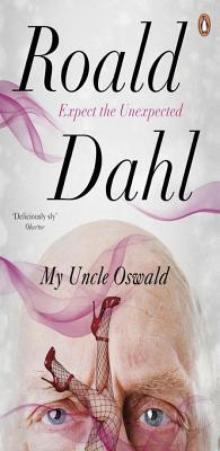 My Uncle Oswald
My Uncle Oswald The Best of Roald Dahl
The Best of Roald Dahl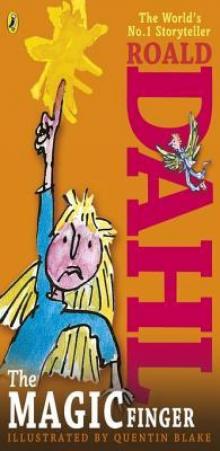 The Magic Finger
The Magic Finger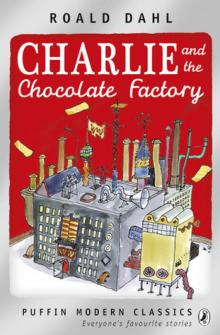 Charlie and the Chocolate Factory
Charlie and the Chocolate Factory Fantastic Mr Fox
Fantastic Mr Fox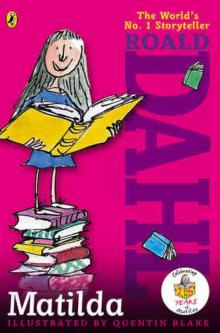 Matilda
Matilda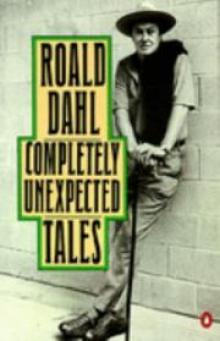 Completely Unexpected Tales: Tales of the Unexpected. More Tales of the Unexpected
Completely Unexpected Tales: Tales of the Unexpected. More Tales of the Unexpected The Wonderful Story of Henry Sugar and Six More
The Wonderful Story of Henry Sugar and Six More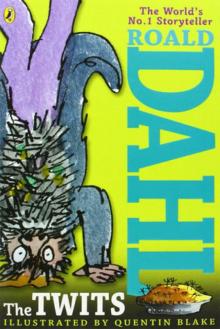 The Twits
The Twits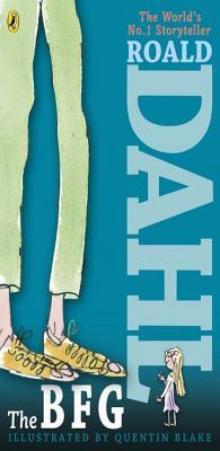 The BFG
The BFG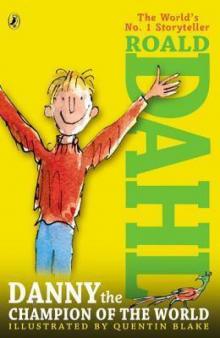 Danny the Champion of the World
Danny the Champion of the World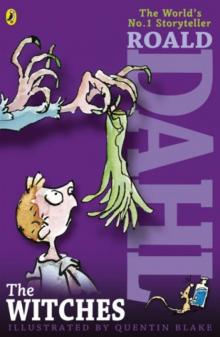 The Witches
The Witches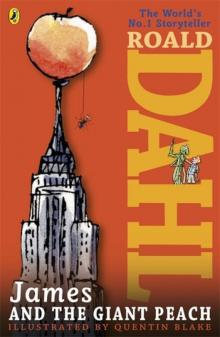 James and the Giant Peach
James and the Giant Peach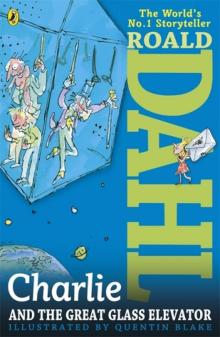 Charlie and the Great Glass Elevator
Charlie and the Great Glass Elevator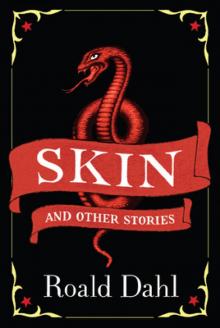 Skin and Other Stories
Skin and Other Stories Kiss Kiss
Kiss Kiss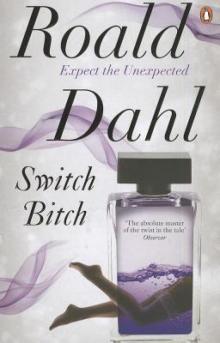 Switch Bitch
Switch Bitch The Giraffe and the Pelly and Me
The Giraffe and the Pelly and Me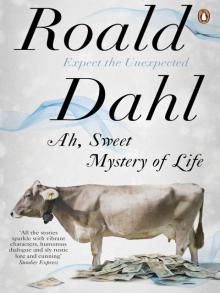 Ah, Sweet Mystery of Life
Ah, Sweet Mystery of Life Fear
Fear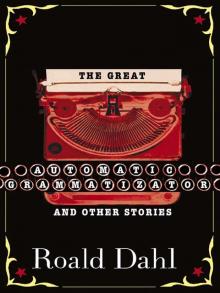 The Great Automatic Grammatizator and Other Stories
The Great Automatic Grammatizator and Other Stories Someone Like You
Someone Like You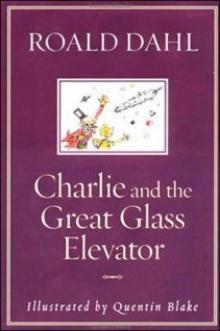 Charlie and the Great Glass Elevator c-2
Charlie and the Great Glass Elevator c-2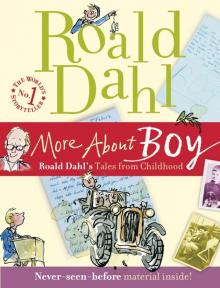 More About Boy
More About Boy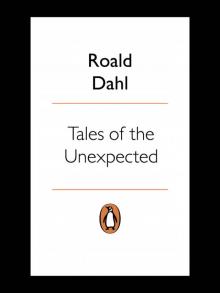 Tales of the Unexpected
Tales of the Unexpected The Umbrella Man and Other Stories
The Umbrella Man and Other Stories Dirty Beasts
Dirty Beasts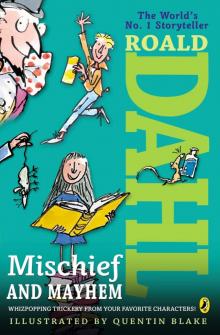 Roald Dahl's Mischief and Mayhem
Roald Dahl's Mischief and Mayhem The Collected Short Stories of Roald Dahl, Volume 1
The Collected Short Stories of Roald Dahl, Volume 1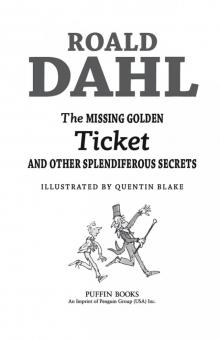 The Missing Golden Ticket and Other Splendiferous Secrets
The Missing Golden Ticket and Other Splendiferous Secrets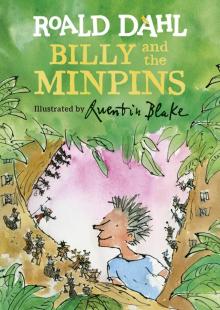 Billy and the Minpins
Billy and the Minpins Over to You
Over to You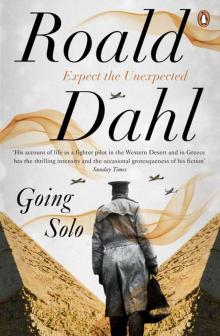 Going Solo
Going Solo Deception
Deception War
War Man from the South ee-3
Man from the South ee-3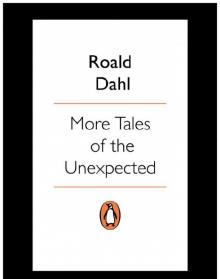 More Tales of the Unexpected
More Tales of the Unexpected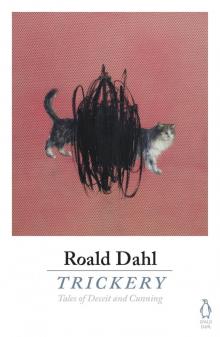 Trickery
Trickery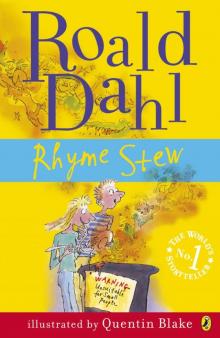 Rhyme Stew
Rhyme Stew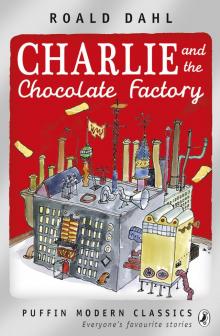 Charlie and the Chocolate Factory (Puffin Modern Classics relaunch)
Charlie and the Chocolate Factory (Puffin Modern Classics relaunch)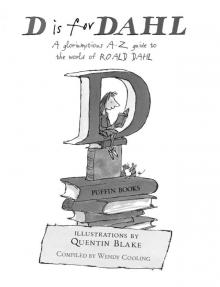 D is for Dahl
D is for Dahl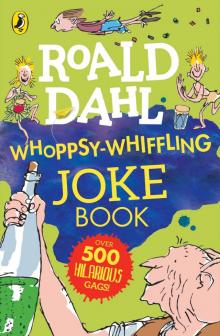 Roald Dahl Whoppsy-Whiffling Joke Book
Roald Dahl Whoppsy-Whiffling Joke Book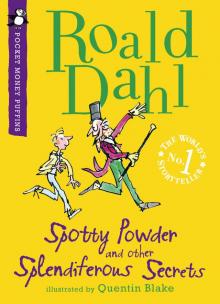 Spotty Powder and other Splendiferous Secrets
Spotty Powder and other Splendiferous Secrets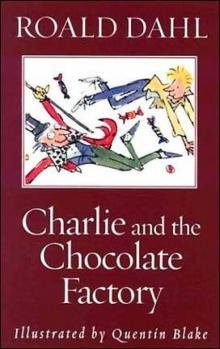 Charlie and the Chocolate Factory c-1
Charlie and the Chocolate Factory c-1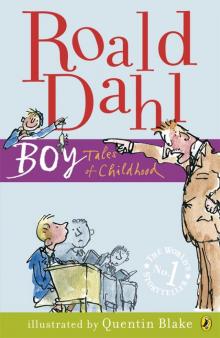 Boy
Boy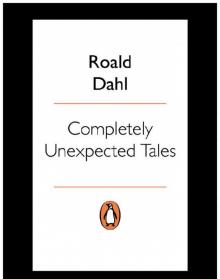 Completely Unexpected Tales
Completely Unexpected Tales Madness
Madness Innocence
Innocence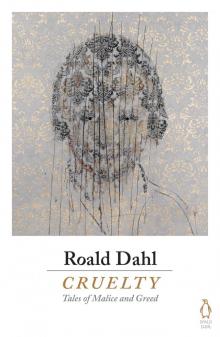 Cruelty
Cruelty George's Marvellous Medicine
George's Marvellous Medicine